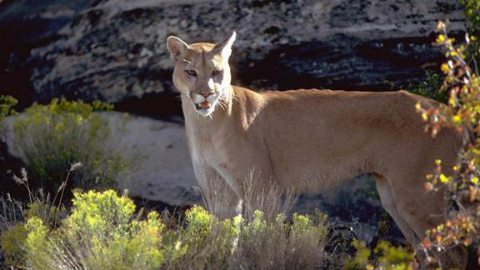Ask an Expert – Tips for Living in Cougar Country

Reports of cougar sightings have increased across Utah this year. This may be related to both the ongoing drought, as habitat conditions deteriorate, and increased outdoor activity, as humans seek solace from COVID-19. With the onset of fall hunting, fishing, hiking and camping, the chance of encountering a cougar may also increase.
Cougars, also known as mountain lions or pumas, can be readily recognized by their large size, tawny color, white muzzle and long tail.
Although cougars are found all across Utah, they are solitary animals, making them a rare sight. The main prey of cougars is deer, so they can be found wherever deer are found. After making a kill, a cougar will often take the carcass to the base of a tree and cover it with dirt, leaves or snow, saving it to feed on later.
Cougar populations in Utah are managed by the Division of Wildlife Resources. This management includes an annual hunting season to help keep populations in balance with their habitats and reduce the potential for human-wildlife conflicts.
Protect your home and surrounding areas.
* To prevent cougars from becoming nuisance animals, do not feed wildlife on your property. Remove wildlife attractants, including pet food, water sources, bird feeders and fallen fruit.
* Keep your yard deer-proof. If your property and landscaping are attractive to deer and other wildlife, cougars may follow the wildlife into your property while searching for prey. Remove dense vegetation, which can make a perfect hiding place for cougars or other wildlife.
* Do not leave young children outside unattended, especially at dawn and dusk.
* Bring pets and livestock inside at night or secure them in a barn or kennel with a roof.
* Provide a secure shelter for hobby farm animals such as poultry, rabbits and goats.
* Encourage others to follow these tips.
Prevent conflicts while recreating.
* Cougars rarely approach groups of people, so do not hike or jog alone in cougar country. Travel in groups and keep everyone together, including children and dogs. Keep dogs on leashes.
* Make noise while hiking to alert cougars of your presence.
* Leave the area if you find a dead animal, especially deer or elk, since it could be a cougar kill, and the cougar may return to defend its food.
Know what to do if you encounter a cougar.
* Cougars avoid human contact. However, if you encounter a cougar, immediately stop what you are doing. Do not run, as this may provoke a prey response and the cougar may pursue you.
* Do not approach the cougar.
* Make yourself look intimidating. Stand tall and make eye contact with the cougar. Make yourself look bigger by opening your jacket and raising your arms and waving them.
* Talk firmly in a loud voice, while backing away slowly, and leave the area.
* If you have children with you, pick them up before they panic and run. When you are picking up a child, keep eye contact with the cougar and do not bend over or turn your back.
* If attacked, fight back! Protect your head and neck, as the neck is the target for the cougar. If you are aggressive enough, the cougar may give up and leave.
* If you have an encounter with aggressive wildlife, please alert the Utah Division of Wildlife Resources (UDWR) office near you. If the encounter or sighting occurs after hours or on the weekend, call your local police department or county sheriff’s office. More information is available at Wild Aware Utah.
For more tips, see the video at https://www.youtube.com/watch?v=qwQ_a3BJhnQ.
By: Terry Messmer, Utah State University Extension wildlife specialist, terry.messmer@usu.edu


 Utah 4-H & Youth
Utah 4-H & Youth